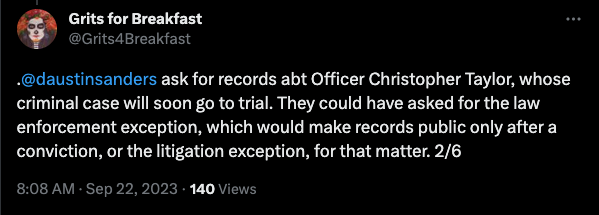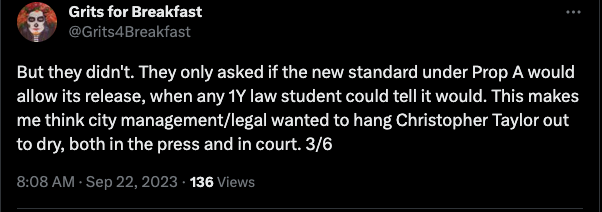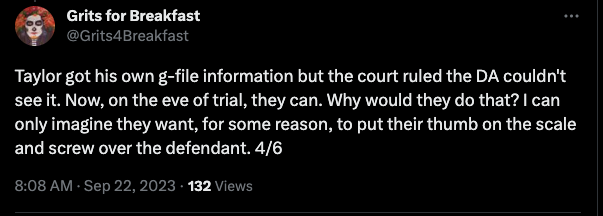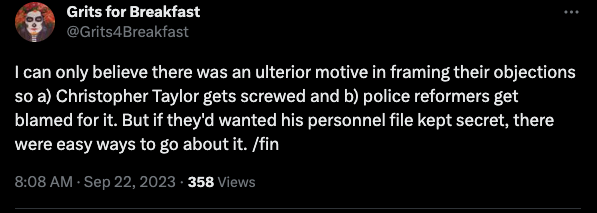Huh? Did the Texas AG side with police reform activists?
Wading through a puzzling open records case.

On Thursday, the Chronicle's Austin Sanders broke some very, very surprising news. The Office of the Texas Attorney General had written an opinion essentially siding with progressive activists who had argued that Austin Police Oversight Act that voters approved in May compelled the city to release police personnel records that had previously been confidential.
At issue is the so-called "G File." That refers to the place where police departments place the records of misconduct investigations that do not result in disciplinary action. Oversight advocates have long argued that the existence of the G File encourages police chiefs to not discipline officers for wrongdoing, lest the details of the investigation reflect poorly on the department as a whole.
The text of the APOA, approved by roughly 80% of voters in May, prohibits the city from maintaining a G File. However, the police union has claimed that that provision of the APOA conflicts with state law and the city's notoriously conservative and transparency-averse law department, along with Interim City Manager Jesus Garza, have sought to delay and undermine implementation of the APOA, prompting a resolution from City Council demanding that they begin implementing it.
Which is what makes the news from the Chronicle extremely counter-intuitive. The Chronicle asked for the G File records of APD Officer Christopher Taylor, who is about to go on trial for the murder of Mike Ramos in 2020. The city responded by seeking an opinion from the AG's office, which responded that the city no longer has a G File and thus has no grounds to withhold the records from the public.
On one hand, oversight advocates claimed vindication. They argue the AG opinion is further evidence that, contrary to what city attorneys and the police unions have claimed, state law allows cities to keep certain police records secret but does not require it.
And yet, those same advocates suspect something fishy is up at the city. Scott Henson, author of the popular criminal justice blog, Grits for Breakfast, and husband to fellow oversight advocate Kathy Mitchell, noted that the city curiously neglected in its filing to the AG to mention a couple exceptions to the open records law that the APOA didn't (and couldn't) overturn. These exceptions allow cities to withhold records if the person in question is under criminal investigation or being sued –– Taylor falls into both categories.




You see, the AG's open records division issues opinions to cities all the time. The opinion is based only on the points presented by the parties; the office does not investigate the issue on its own.
Knowing this, the city perhaps chose not to submit boilerplate arguments that it otherwise always includes in these situations because it was hoping to prompt an opinion from the AG's office that would outrage the police lobby and prompt the Legislature, which is likely to begin a special session next month, to pass a law to largely nullify the APOA. Then the conservative city management won't have to abide by the APOA, which has always been its preference.
We'll see. The city hasn't actually responded to the AG opinion by releasing Taylor's records, at least not to the Chronicle. However, the more important point here may not be what the Chronicle is able to get its hands on, but what District Attorney Jose Garza, who has also previously been denied access to Taylor's G File, is able to obtain.
The city has asked the AG's office to reconsider, and will submit an updated case. If it again fails to cite the well-established exceptions to open records laws, then something is definitely up.
Wait, the AG? Are we really talking about Ken Paxton?
Yes, despite being led by a clownishly corrupt crook, much of the work of the attorney general's office is done by competent, nonpartisan attorneys. That's not to say that their work cannot be compromised by the impulses of their sleazebag boss –– it clearly has been, repeatedly –– but there is work that comes out of that office that has nothing to do with him.
The opinion is dated 9/18, two days after Paxton was acquitted and restored to heading the office, which had been run by a caretaker during the previous several months following his impeachment.
It's not hard to imagine, of course, that Paxton could have been involved in this or will become involved in this in the future.





